Text




Battleship NEW JERSEY departing Camden, New Jersey for Philadelphia.
"What a historic day on the Delaware River! The tugs Beverly R. McAllister, McAllister Responder, Reid McAllister and Robert E. McAllister had the awesome responsibility of moving the battleship, USS New Jersey. It is the first time the New Jersey has moved in over 20 years. The famous floating museum is going to drydock to undergo maintenance and refurbishment.
The tugs, with over 14,000 hp combined, transited the ship from her longtime home in Camden, NJ south down the Delaware. On the route she passed under the renowned Walt Whitman Bridge before docking at Paulsboro terminal. Many American flags were seen flying along the route, saluting the most decorated battleship in US history as she sailed past.
Congratulations to McAllister Towing of Philadelphia, docking pilot Captain Joseph E. Benton III and the captains and crews of the tugboats in executing this momentous operation safely and securely. Bravo to you all!"
Photographed on March 20, 2024.
Posted on Facebook by MCALLISTER TOWING: link
101 notes
·
View notes
Photo

“Ella The Tug” photo : @xshaydx follow on Instagram
15K notes
·
View notes
Text
Titus Flavius and his indelible traces.
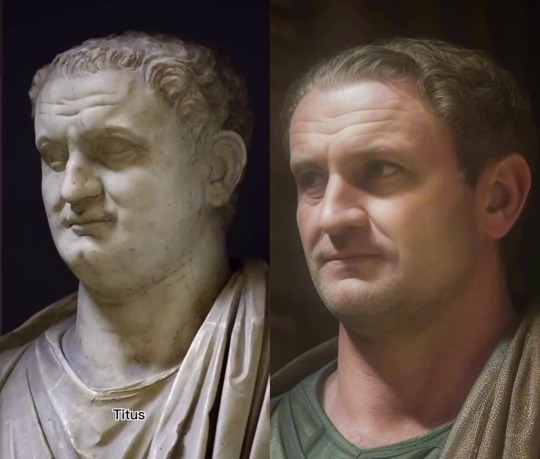
Titus Flavius was born in Rome on December 30 of the year 39. He was a direct descendant of a loyal soldier of Pompey the Great during the Civil War against Julius Caesar. After Pompey's defeat at the Battle of Pharsalia, his life was spared by Julius Caesar, returned to home and became a Publicanus (tax collector). In an incredible twist of fate, the Flavians, a family of peasants, who came from the defeat of the past, ended up occupying the throne founded by Caesar's heir.
During reign of 'Caligula' (37-41) Vespasian, father of Titus, was Aedile of Rome. According Suetonius, Emperor passed by a street that was very dirty, ordered Vespasian to be brought and the garbage thrown on him, and then told him "Do your job well, keep the city clean."
During the reign of Claudius (41-54) Vespasian obtained the position of praetor and the command of one of the legions that went to the conquest of Britannia. In 51 was Consul.
After rebellion in Judea in the year 66, emperor Nero chose the experienced general Vespasian to put an end to the conflict. Vespasian went with his son, Titus, who was then 26 years old, and was an excellent army's officer.
In June 68, after of the death of Nero, the first civil war of the imperial era broke out, which would last until December of the following year. In the chaotic year 69, known as The Year of the 4 emperors: the first ,Galba was assassinated; the second, Otho committed suicide; the third, Vitellius, was executed, the fourth, Vespasian was proclaimed emperor by the army, ending the civil war. Titus was left in command against the rebellion in Judea.
A historical event of mystical relevance.
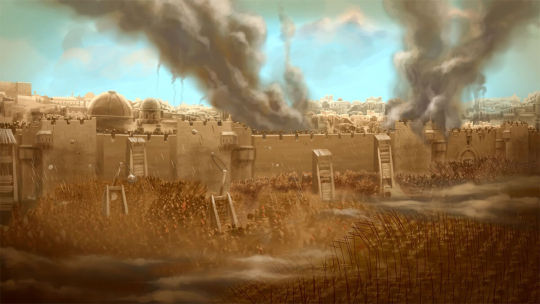
After months of bloody fighting, on August of the year 70, the Temple of Jerusalem was looted, burned and demolished by Titus's troops.
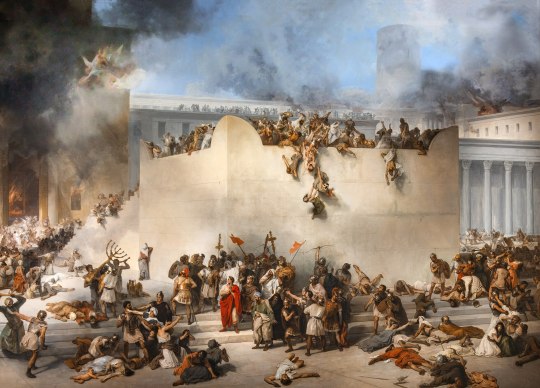
'La distruzione del tempio di Gerusalemme' by Francesco Hayez, 1867
Titus along his father and brother had a triumphal parade in Rome. Years later, in the place where they passed, his younger brother, the Emperor Domitian, ordered the construction of the Triumphal Arch. One of its extraordinary relief depicts the Triumph with the treasures of the Temple. It should be noted that Vespasian and his two sons had the name TITUS FLAVIUS, so emperor Domitian (Titus Flavius Domitian) built the famous Arch of Titus not necessarily in honour of his brother - as is popularly believed - but rather in honour of the Triumph of the Flavians.
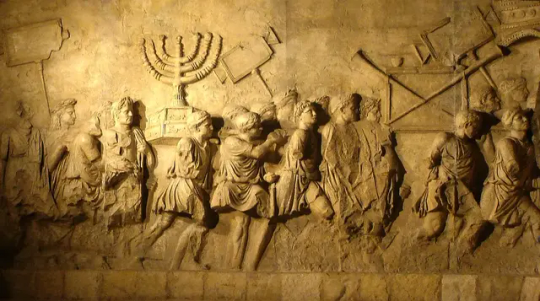
Some modern historians agree that such a Triumph was not due to what happened in Jerusalem, since the First Jewish–Roman War did not really end completely in August 70, but in April 73 at Masada. The real reason was the accession to the throne of Vespasian, and the presentation of Titus as heir. As Dio Cassius recounts, with Vespasian declared emperor, Titus and his brother Domitian received the title of Caesar in the name of the Senate.
But Vespasian become emperor by defeating other Romans in a civil war. Triumphal parades could not be held by defeating other Romans, so the rebellion in Judea was just a perfect excuse for the celebration.
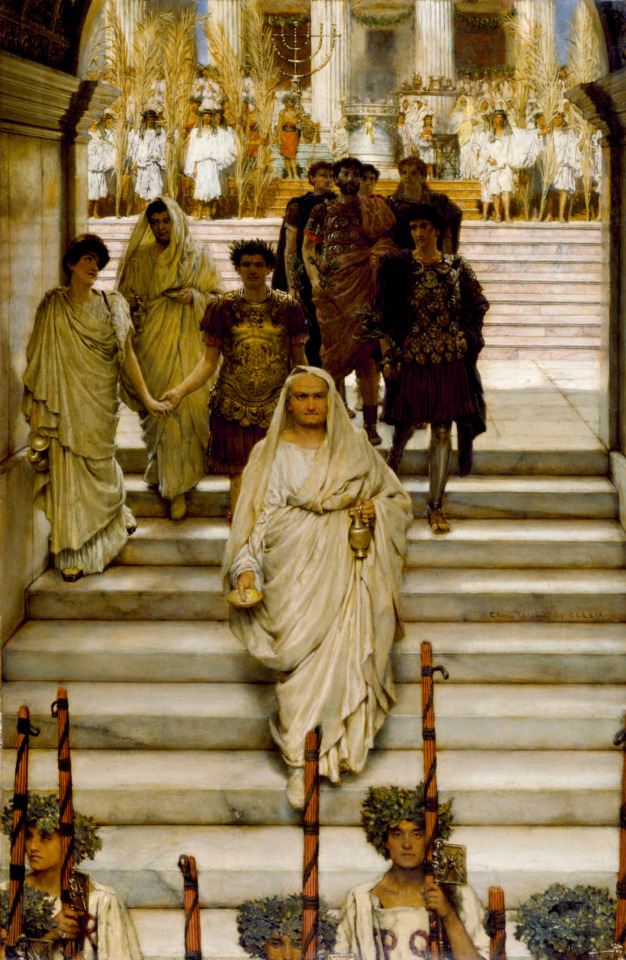
The Triumph of Titus: The Flavians, by Sir Lawrence Alma-Tadema (1885)
The central figure in white is not the Emperor Titus but his father emperor Vespasian. Behind him we see his youngest son Domitian, holding the hand of his wife Domitia Longina, and behind them is Titus, dressed as his father. She looks romantically at Titus, and he returns a knowing look. Lawrence Alma-Tadema thus portrayed the historical rumour that Emperor Titus Flavius was having an affair with his sister-in-law.
Vespasian decided to tear down the Domus Aurea, the palace that Nero had ordered to be built for his own enjoyment, and build "a palace for the enjoyment of the people". He saw his work almost completed but died of illness on June 23, 79, at his estate. The next day Titus Flavius succeeded him.
A mess with the gods.
Four months later a tragic event occurred. The peaceful mount Vesuvius exploded; Some Roman cities literally disappeared with their inhabitants, others were severely damaged with many dead and wounded. Among the dead was the prestigious writer and Naval Commander Pliny the Elder, a close friend of the imperial family, who had dedicated his book 'Naturalis historia' to Titus.
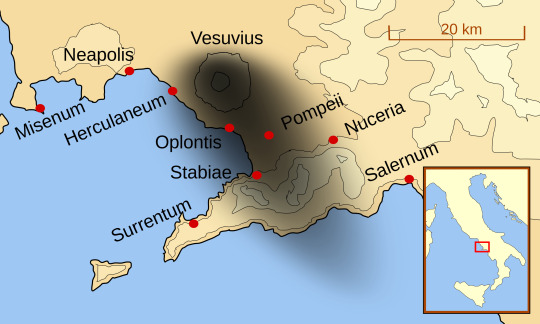
Emperor immediately went to the scene of the disaster. He made immense works and donations to help those affected in the area.
Months after the eruption of Vesuvius, while Titus was visiting devastated Pompeii for the second time, a fire broke out in Rome that lasted three days. Several important buildings were severely damaged, according to Dio Cassius the Pantheon, the Temple of Jupiter, the Theatre of Pompey, among others. To make matters worse, a brief but mysterious plague broke out immediately after the fire, although it is not known what kind of disease it was or how many died.
Soon rumors began to circulate that the gods had a personal problem with Titus because of his forbidden love for Princess Berenice, great-great-granddaughter of Herod the Great. The ancient Romans believed that when a misfortune affected everyone, such as natural disasters and plagues, it was due to the wrath of the gods and that this happened when the gods did not like the ruler.
Although he was a very popular emperor, he did not want to risk those tragedies affecting his image, so he decided in the year 80 to accelerate his father's work, which still had to wait to be completed. And so began the inauguration of the most famous "stadium" in history : The Flavian amphitheater.
There were 100 days of games: Recreations of naval battles, with that monumental site full of water, exhibitions of wild animals and the legendary gladiator fights. Those shows were free for the people.They had never seen an amphitheater of such grandeur.
Very soon the people of Rome forgot about Vesuvius, the conflagration, the plague, and Berenice.
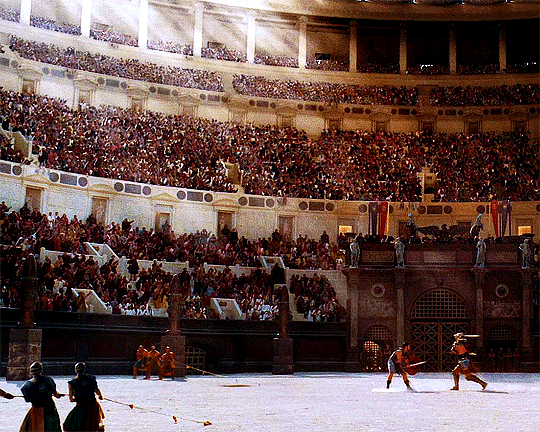
In fact, its height and shape were a real architectural novelty, something completely different from the classic Roman amphitheatres. Because of the sculpture, Nero's Colossus, the only thing that Vespasian did not order to be demolished and that remained imposing next to the amphitheatre, over time people began to say "let's go to the Colossus" (the Colosseum). Ironically, the great work that Vespasian ordered to be built to replace the Domus Aurea, and Titus officially inaugurated, instead of being known as the Amphitheatre Flavius, went down in history with the name of the sculpture that Nero ordered to be built.
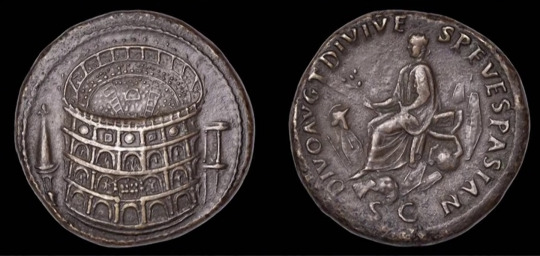
A sesterce from the time of Emperor Titus.
The pseudo-Nero
After Nero's death, rumors began to circulate that his suicide was not real. Years later, this rumor had spread throughout the empire and even beyond its borders. Suetonius wrote about an event that he experienced during the reign of Domitian: "Twenty years after his death, when I was young, a man of obscure origin appeared, who claimed he was Nero; And the name Nero was still in such favour with the Parthians that they supported him vigorously and surrendered him with great reluctance."
The Parthians were happy believing that Nero was alive because during his reign he signed the peace treaty.
Titus had to face the rebellion of a guy called Terentius Maximus, another Pseudo-Nero that according Dio Cassius "He resembled Nero in voice and appearance and, like him, he played the lyre." The impostor had a lot of followers in the eastern Roman provinces. The Parthian king received this man and made preparations for him to return to Rome as legitime emperor but he was executed when his true identity was revealed.
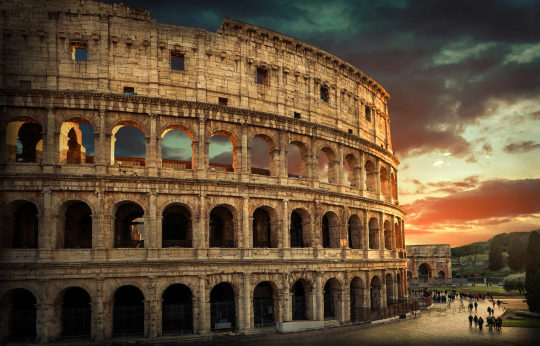
On September 13, 81, Titus died at the age of 41 on his father's farm, due to fever. His brief reign was very prosperous and popular and free of military and political conflicts. Having only a daughter (Julia Flavia), his successor was his brother Domitian who ruled for 15 years.
According to Roman writers, his last words were: "I regret nothing except one thing"; And some believe that he regretted not marrying Berenice.
The Colosseum and the Wailing Wall are undoubtedly the two indelible traces of Titus Flavius.
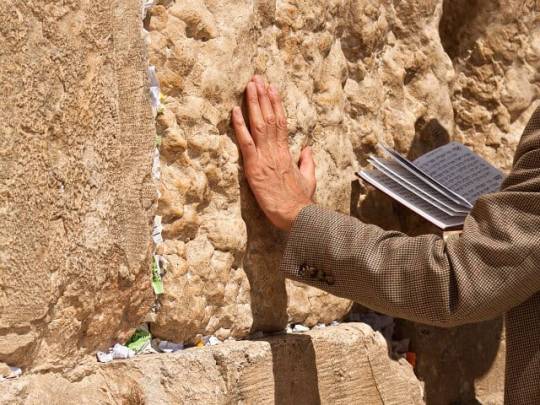
231 notes
·
View notes




























